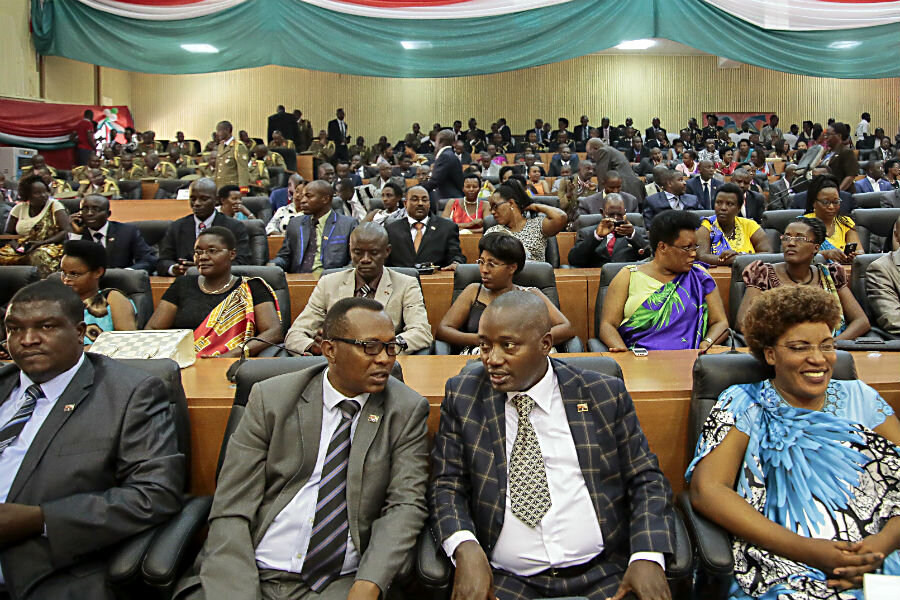Burundi votes to leave ICC: A blow to global justice
Loading...
| Kigali, Rawanda
Lawmakers in Burundi overwhelmingly voted Wednesday in support of a plan to withdraw from the International Criminal Court, something no country has ever done.
The decision escalates a bitter dispute with the international community over the human rights situation in the East African country, which has seen more than a year of deadly violence after President Pierre Nkurunziza made a controversial decision to pursue a third term.
No state has withdrawn from the ICC, according to the Coalition for the International Criminal Court, a nonprofit that supports the court's work. The court prosecutes cases of genocide, war crimes, and crimes against humanity. In a significant shift, the ICC announced last month that it would also begin pursuing cases involving environmental destruction, misuse of land, and land grabs as crimes against humanity.
“Company bosses and politicians complicit in violently seizing land, razing tropical forests, or poisoning water sources could soon find themselves standing trial in The Hague alongside war criminals and dictators," said Gillian Caldwell, executive director of the advocacy group Global Witness, in a statement.
Meanwhile, in Burundi, 94 out of 110 lawmakers voted in favor of the withdrawal plan, months after the ICC announced it would investigate the country's ongoing violence.
In announcing a preliminary examination by the International Criminal Court, prosecutor Fatou Bensouda said in April that she had seen reports of killings, disappearances, imprisonment, torture and rape.
“All these acts appear to fall within the jurisdiction of the ICC,” she said. “. . . At least 3,400 people have been arrested and over 230,000 Burundians forced to seek refuge in neighboring countries.”
Some African countries have threatened a withdrawal from the Rome Statute, the treaty that created the ICC, accusing the court of disproportionately targeting the continent.
Only Africans have been charged in the six cases that are ongoing or about to begin, though preliminary ICC investigations have been opened elsewhere in the world.
"Burundi civil society is clear that their government is withdrawing from democracy, human rights and the rule of law, not the ICC," said William R. Pace, convenor of the Coalition for the International Criminal Court. He added that "African governments overwhelmingly voted for and ratified the ICC treaty, stating that they did not want a repeat of the Rwandan genocide, where there was a breakdown in the rule of law and justice."
Of the 124 countries that are parties to the Rome Statute, 34 are African, the largest continental bloc. The United States is not a party to the treaty.
Burundi's decision is not immediate. Observers say a county wishing to withdraw from the ICC must write to the U.N. secretary-general stating its intention, and the withdrawal takes effect a year after the day the secretary-general receives the letter.
No such letter had yet been received, said the spokesman for the U.N. secretary-general, Stephane Dujarric.
Vital Nshimirimana, a Burundian rights activist, urged the U.N. to challenge the government's decision.
"Already, we have information that intelligence agents are torturing, killing Burundians behind closed doors," he said. "The world ought to rescue the people of Burundi."
Burundi's government has repeatedly said it is the victim of propaganda by exiles and opponents who want to diminish its credibility.
Hundreds have died in Burundi since Nkurunziza last year pursued and won a third term that many call unconstitutional. Since the ruling party announced his candidacy in April 2015, Burundi has seen violent street protests, forced disappearances and assassinations. More than 260,000 have fled.
On Monday, Burundi's government banned three U.N. human rights investigators from entering the country following the release of a report that cited massive rights violations allegedly perpetrated by security agencies.
The push among some African countries to withdraw from ICC began after the court indicted Kenyan President Uhuru Kenyatta on charges of crimes against humanity for 2007 post-election violence in which more than 1,000 died. The ICC prosecutor said threats to witnesses, bribery and lack of cooperation by Kenya's government led to the case's collapse.
Some countries want a separate African court with jurisdiction over rights abuses.
___
Associated Press writer Mike Corder in The Hague contributed.







